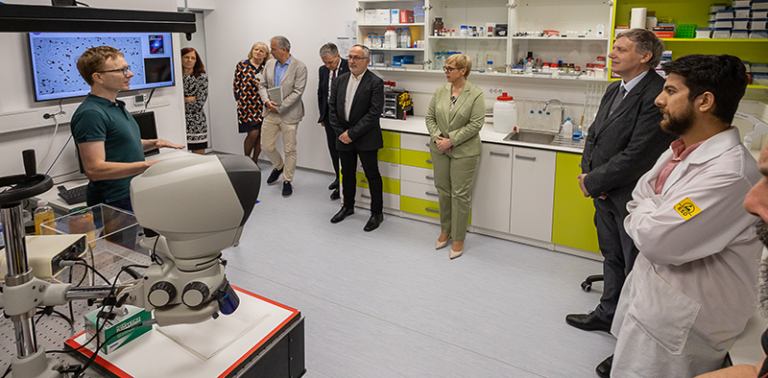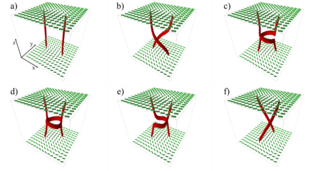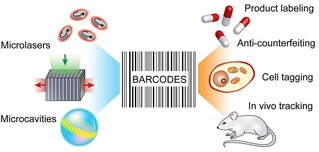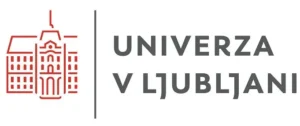News

The president of Slovenia, Nataša Pirc Musar, visited the Bio-Integrated Photonics Lab
On June 2, 2023, the President of Slovenia, Nataša Pirc Musar, visited the Bio-Integrated Photonics Lab at the Jožef Stefan Institute. Matjaž Humar and Abdur Rehman Anwar presented her with some recent results under the project FoodTraNet. They conducted a live demonstration of the photonic barcodes. There was also a short debate about the importance of novel methods for tracking quality and authenticity of various foods.

Article in Crystals
Samo Kralj from the Department of Solid State Physics F5 and colleagues from Faculty of Mathematics and Physics, University of Ljubljana and Case Western Reserve University, Cleveland published an article in the journal Crystals with the title Reconfiguration of nematic disclinations in plane-parallel confinements.
They study numerically the reconfiguration process of colliding |m|=1/2 strength disclinations in a nematic liquid crystal (NLC). A Landau-de Gennes approach in terms of a tensor nematic order parameters is used. Initially, different pairs of parallel wedge disclinations were formed connecting opposite substrates confining the NLC in a plane-parallel cell. The collisions are triggered by the relative rotation of the azimuthal angle of the substrates that strongly pin the defect end points. They illustrate qualitatively different rewiring processes.
Article in Front. Soft. Matter
Amid Ranjkesh, Samo Kralj in Aleksander Zidanšek from the Department of Condensed Matter Physics F5 and colleagues from Faculty of Natural Sciences and Mathematics, University of Maribor and Jožef Stefan International Postgraduate School have published a paper in Front. Soft. Matter with the tittle Phase behavior of nematic-nanoparticle mixtures.
We study the effects of nanoparticles (NPs) on thermotropic nematic liquid crystals (LCs) in relatively dilute NP–LC mixtures. We are interested in the fundamental generic mechanisms that quantitatively and qualitatively affect the phase behavior of LCs. A simple molecular field analysis shows that a phase transition will likely occur upon entry into the ordered phase. Moreover, the interaction between nematogenic NPs and LCs could force a sergeant–soldier-like behavior, in which only the phase behavior of one component is affected despite the symmetric appearance of the coupling term. When NPs are anisotropic, their influence on LC phase behavior can be qualitatively different depending on the anchoring, even in the absence of the disorder. We illustrate numerically that a random-field-type disorder might impose either short-range, quasi-long-range, or even long-range order, which might survive.

Article in ACS Photonics
Abdur Rehman Anwar, Maruša Mur, and Matjaž Humar from the Department of Condensed Matter Physics F5 have published a review paper in ACS Photonics entitled Microcavity- and Microlaser-Based Optical Barcoding: A Review of Encoding Techniques and Applications. In the paper they review the potential of microcavity- and microlaser-based barcodes for a broad range of applications such as cell tracking, anticounterfeiting, and product labeling. In microcavity-based barcodes the information is encoded in various ways in the properties of the emitted light, most frequently in the spectrum. Spectra of microcavity- and microlaser-based barcodes contain very narrow spectral lines and depend on properties of the microcavity, such as size, shape, and gain material, therefore enabling generation of millions of unique barcodes. Microcavity- and microlaser-based barcoding is a very powerful tool which holds great promise. By developing new kinds of microcavities as well as optical systems for their detection, they could become both a tool in research as well as useful for labeling products in everyday life.
Article inJournal of Physics: Conference Series
Tina Arh, Matjaž Gomilšek, Andrej Zorko, and colleagues from Switzerland have published a paper in the Journal of Physics: Conference Series with the title An experimental procedure to determine quantitative muon Knight shifts about muon spectroscopy experiments. In the paper, they presented a method for more accurate determination of internal fields in a studied sample via simultaneous measurements of the response of a sample and a reference silver plate.
